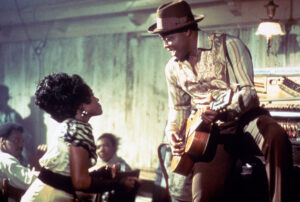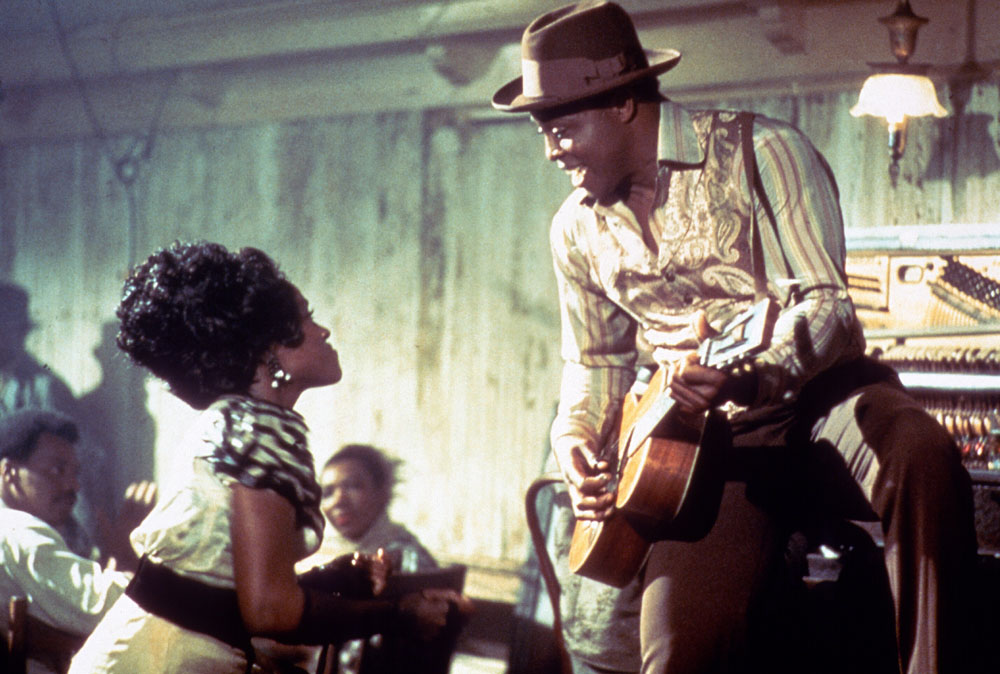Movie Info
Movie Info
- Run Time
- 2 hours and 6 minutes
- Rating
- PG
VP Content Ratings
- Violence
- 3/10
- Language
- 2/10
- Sex & Nudity
- 2/10
- Star Rating
Relevant Quotes
Why, O Lord, do you stand far off?
Why do you hide yourself in times of trouble?
In arrogance the wicked persecute the poor—
let them be caught in the schemes they have devised.

This film bio of Huddie Ledbetter boasts both a sterling director and writer, former LIFE photographer Gordon Parks directing and the prolific writer Ernest Kinoy author of the script. (And I do mean prolific—there are 76 credits listed in IMDB, including the wonderful Gore Vidal’s Lincoln, starring Sam Waterson and Mary Tyler Moore as the President and First Lady.* As you might expect from Parks, the film depicts well the racism and poverty that beset the song writer/singer. Nor does it whitewash his personal flaws, which included his penchant for womanizing and a violent temper that eventually land him in jail and state prison. As with most film bios, the historical facts are dealt with loosely, so if made today, there would be a pretitle saying “This Film is Mostly true.”
The film begins in the 1930s in a Texas prison with ethnomusicologist Professor John Lomax (John Broadhead) and his son recording the country blues singer for their collection of folklore for the Library of Congress. Huddie (Robert E. Mosely) tells of his youth near Shreveport, his leaving home due to trouble caused by his temper, and his encountering on Shreveport’s Fannin Street Miss Eula (Madge Sinclair) who took him into her brothel and gave him his nickname Lead Bbelly. He becomes so popular playing and singing that he boasts of his musicianship. When an old man challenges him, the youth is surprised to find someone of equal talent—and his guitar has twice as many strings. The pair have to flee town, with Huddie buying that guitar. There follows a string of adventures, including an escape from jail and terms spent in Louisiana prisons. Spaced throughout is a generous number of Lead Belly’s songs, including “Goodnight, Irene, “Bring Me a Li’l Water Silvy,”” “The Midnight Special,” “Rock Island Line,” “Take this Hammer,” and “The Bourgeois Blues.”
For a while Lead Belly’s companion is fellow musician Blind Lemon Jefferson (Art Evan), two meeting on a train—in a segregated coach, of course. They buy a car together and argue about who should drive it. “You’re drunk,” Jefferson tells Lead Belly. “Yeah, but you’re blind,” Lead Belly says. The latter, of course, drives, and as the camera captures them speeding along rural roads, we see the face of black Southern living—tumble down shacks, their occupants in the fields picking cotton, or occasionally toiling on chain gangs. Huddie was to become a part of the latter, forced at times to wear manacles.
Perhaps the most poignant scene is when Huddie’s father Wes (Paul Benjamin) comes to Angola in the vain hope that he can buy his son’s way out of prison. Huddie has been put into a metal box as punishment for an escape attempt, so the old man does not see him. He offers the warden, Captain Freeman, cash for his son’s release, and the warden has to turn him down, trying to explain to the naïve man that the system does not work that way. After another attempt. The old man asks for a favor. Will the warden take the money and buy his son a 12-string guitar so he can continue his music? The man turns out to be the rare white man in the film with a heart, agreeing to do so. He asks if he would like to see his son, but the old man apparently cannot bear to see his son in such a condition, so he leaves without visiting him. The last we see of him is from Huddie’s viewpoint—the back of the father exiting through the prison gate. A beautiful scene of grace!
Of a far different nature is that of Huddie being summoned from his labor to play for the visiting governor. (yes, the warden kept his promise.) The white suited Gov. Pat Neff (John Henry Faulk) is sitting on the small porch of Captain Freeman’s house when the manacled prisoner shuffles up, guitar in hand. He plays the part of the boot-licking fool as he sings a song made up on the spot. Using the Biblical story of Paul and Silas locked in jail but freed by a miracle. In his lyrics Lead Belly suggests that the Governor might grant him a pardon. The whites love the performance, as much for the demeaning obsequiousness of the performance as the song itself. Huddie hates what he has just done so much that when another prisoner criticizes him, he attacks him.
Like Huddie, director Gordon Parks knew firsthand the pain inflicted by racism. And like the musician, Parks rose to fame, first as a photographer and then as a filmmaker (and musician too). Huddie Ledbetter would have had a hard struggle as a musician anyway, with his quick temper, drinking, and love for women. With his black skin, his eventual success is partly miraculous as well s talent and hard effort based. The film deals only with Lead Belly’s life in the South, leaving it up to the curious viewer to look for further information elsewhere. To see his roots is enough to make us appreciate the obstacles he overcame—and also to join with the psalmist in questioning the justice of this old world.
* Reviewed in the Feb. 95 VP
This review will be in the November issue of VP along with a set of questions for reflection and/or discussion. If you have found reviews on this site helpful, please consider purchasing a subscription or individual issue in The Store.

